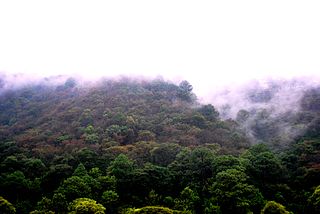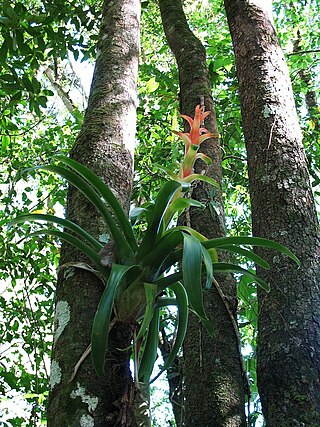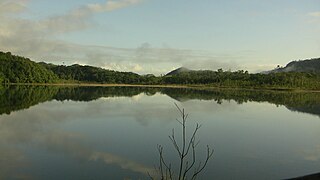
A transboundary protected area (TBPA) is an ecological protected area that spans boundaries of more than one country or sub-national entity. Such areas are also known as transfrontier conservation areas (TFCAs) or peace parks.
Concepción Las Minas is a municipality in southern Chiquimula department of Guatemala in Central America. It has a population of 11,693 (2018) and cover an area of 222 km2.

The Chamela-Cuixmala Biosphere Reserve is a biosphere reserve on the Pacific coast of the Mexican state of Jalisco. The park was founded in 1993 and covers 131.42 square kilometres in La Huerta Municipality. The land is mountainous and contains dry tropical forest and rolling hills and alluvial plains.
Maderas del Carmen is a biosphere reserve in the northern Mexican state of Coahuila.

The Central American pine–oak forests is a tropical and subtropical coniferous forests ecoregion in the mountains of northern Central America and Chiapas state in southern Mexico.
Biosphere reserves in Guatemala include:

The Trifinio Fraternidad Transboundary Biosphere Reserve is a transboundary protected area located where the borders of El Salvador, Guatemala and Honduras meet. It protects the Montecristo massif and its cloud forests across the three countries' borders.
Punta de Manabique is a small peninsula that separates Amatique Bay from the Gulf of Honduras. It is located on Guatemala's east coast, some 20 km north of Puerto Barrios.
Under UNESCO’s Man and the Biosphere Programme, there are 125 biosphere reserves recognized as part of the World Network of Biosphere Reserves in Latin America and the Caribbean. These are distributed across 21 countries in the region.
Montecristo Trifinio National Park is a national park in Honduras. It was established on 1 January 1987 and covers an area of 54 square kilometres.

Montecristo National Park is a large national park centered on the Montecristo cloud forest in Mesoamerica. Montecristo National Park is located in the north-western tip of El Salvador, a country in Central America known for its wildlife diversity.

The Central American montane forests are an ecoregion of the tropical and subtropical moist broadleaf forests biome, as defined by the World Wildlife Fund, located in mountains of Central America.

The Volcán Tacaná Biosphere Reserve is a UNESCO Biosphere Reserve at the Tacaná Volcano in Chiapas, Mexico, on the border with Guatemala. The volcano is part of the Central America Volcanic Arc. The 6,378 hectares (24.63 sq mi) reserve contains fragile ecosystems very rich in wild flora and fauna species of cultural, scientific, economic and biological relevance. Its rich biodiversity and high endemism are found particularly in the high mountain ecosystem and landscapes and in the volcanic edifice which presents geophysical features of great scientific and aesthetic value. Average annual rainfall can amount to 2,000–5,000 millimetres (79–197 in), as in the case of Soconusco.

Nahá–Metzabok Biosphere Reserve is a biosphere reserve in southeastern Mexico. It is located in the state of Chiapas, on the northeastern flank of the Chiapas Highlands. The reserve protects montane rain forests, pine and oak forests, and natural lakes.
Selva El Ocote is a biosphere reserve in Mexico. It includes mid-elevation and highland rain forests and extensive caverns.

La Sepultura is a biosphere reserve in southern Mexico. It protects a portion of the Sierra Madre de Chiapas range in the state of Chiapas.

El Triunfo Biosphere Reserve is a biosphere reserve in southern Mexico. It is in the Sierra Madre de Chiapas in southern Chiapas.
Lacan-Tun Biosphere Reserve is a protected natural area in southeastern Mexico. It is located in the Lacandon Forest of eastern Chiapas state, where it protects 618.74 km2 of lowland rain forest. Lacan-Tun reserve was established by the Mexican government in 1992.
Tawahka Asagni Biosphere Reserve is a protected area in Honduras. The reserve was established in 1999, and covers an area of 2509.42 km2.










